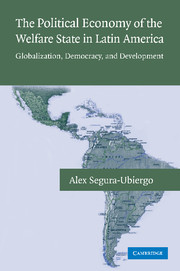 The Political Economy of the Welfare State in Latin America
The Political Economy of the Welfare State in Latin America Book contents
- Frontmatter
- Contents
- Tables and Figures
- Acknowledgments
- 1 Introduction
- 2 The Historical Evolution of Welfare Systems in Latin America: Qualitative Comparative Analysis
- 3 Theoretical Framework and Main Hypotheses
- 4 Determinants of Social Spending in Latin America: A Time-Series Cross-Section Analysis, 1973–2003
- 5 Chile: A Classic Latin American Welfare State under Authoritarian Stress (1973–1989) and Democratic Reinvention (1990–2000)
- 6 Costa Rica: Globalization, Gradual Reform, and the Politics of Compensation, 1973–2002
- 7 Peru: Political Instability, Regime Change, and Late Economic Reform in a Non-Welfare State, 1973–2000
- 8 Conclusion: Summary and Final Reflections on the Sustainability and Effectiveness of Latin American Welfare Systems
- Bibliography
- Index
3 - Theoretical Framework and Main Hypotheses
Published online by Cambridge University Press: 10 July 2009
- Frontmatter
- Contents
- Tables and Figures
- Acknowledgments
- 1 Introduction
- 2 The Historical Evolution of Welfare Systems in Latin America: Qualitative Comparative Analysis
- 3 Theoretical Framework and Main Hypotheses
- 4 Determinants of Social Spending in Latin America: A Time-Series Cross-Section Analysis, 1973–2003
- 5 Chile: A Classic Latin American Welfare State under Authoritarian Stress (1973–1989) and Democratic Reinvention (1990–2000)
- 6 Costa Rica: Globalization, Gradual Reform, and the Politics of Compensation, 1973–2002
- 7 Peru: Political Instability, Regime Change, and Late Economic Reform in a Non-Welfare State, 1973–2000
- 8 Conclusion: Summary and Final Reflections on the Sustainability and Effectiveness of Latin American Welfare Systems
- Bibliography
- Index
Summary
This chapter presents an analysis of the economic and political factors that are hypothesized to have affected the evolution of social spending in Latin America over the last three decades. The chapter draws on the welfare state literature to identify the correlates of social spending and adapts them to the reality of the developing world and to the middle-income countries of Latin America in particular. To this end, possible causal factors are divided into two sets of economic and political hypotheses. The purpose of the chapter is to lay down the theoretical foundations for the empirical analysis presented in Chapter 4. The chapter is organized in two parts. The first part discusses the hypothesized effects of three fundamental groups of economic factors on the fiscal and macroeconomic priority of social spending in Latin America: (1) economic development, (2) fiscal constraints, and (3) trade openness and capital mobility. The second part discusses two sets of political factors: (1) regime type (democracy/nondemocracy) and (2) the partisan orientation of the Executive Branch.
In the discussion of different hypotheses, the chapter develops two theoretical ideas that are key to understanding why welfare state development in Latin America has been affected by radically different dynamics from those that most researchers attributed to Western European countries, where most of the study of the welfare state has so far focused.
- Type
- Chapter
- Information
- The Political Economy of the Welfare State in Latin AmericaGlobalization, Democracy, and Development, pp. 77 - 126Publisher: Cambridge University PressPrint publication year: 2007


